The day the president died
Five from Harvard recall JFK’s assassination, and what followed
They are the touchstone moments, the rare flashpoints in American life where all who experienced them remember exactly where they were, how they felt, how their lives changed. The 9/11 attacks provide one such memory, the Pearl Harbor bombings another, and the killing of President John F. Kennedy a third.
Kennedy’s assassination happened 50 years ago, but those affected remember the details of Nov. 22, 1963, as if it were yesterday. The Gazette’s reporters asked five members of the Harvard community how they recall that day, and how it affected them. Here’s what they remember, and what happened afterward:
IN SHOCK, WALKING AWAY FROM THE STORY
Marvin Kalb
Edward R. Murrow Professor of Practice Emeritus
Harvard Kennedy School
I was the chief diplomatic correspondent for CBS News during those days. And I had just been at a briefing that Gov. Averell Harriman gave about a trip to Southeast Asia that he had just completed. He tried to persuade us that all of Southeast Asia was in support of the war in Vietnam. I wrote a 50-second radio spot and went into the radio booth that CBS had on the second floor of the State Department. When I picked up the earpiece to call in to the studio to do the recording of the piece, I heard the voice of Allan Jackson, who was one of the principal radio anchors at the time, telling the American people that the president has just been shot.
I did not immediately understand that he was speaking of President Kennedy. I was in a bit of a haze until I heard him later in the broadcast speak specifically about President Kennedy, about Dallas, and the seriousness of the wound. At the very beginning, I didn’t know which president he was talking about. And I did not think it was Kennedy. My mind simply wasn’t there. And then when I heard him specifically say — I remember sitting in this very small, darkened broadcast booth in a state of some shock. I was not responding in a very professional way, by which I mean: “Wow, what a great big story this is, and I wonder what part I can play in it.” I was in a state of shock, and I sat there until finally, I believe it was 1 o’clock, I heard Walter Cronkite announce quite specifically that “President Kennedy is dead.”
I knew immediately that my bureau chief would call me to come into the studio and help with the anchoring of the CBS News, and I also knew that I couldn’t do it. And so I did what I hope was the only totally nonprofessional thing I’d ever done in my life: I left the broadcast booth, left the State Department, and began to walk around the building itself trying to compose myself. And when I had completed this rather long walk, because it’s four long blocks, I still felt that I could not, that my mind was not clear enough to do a broadcast. That’s why I walked around it a second time. And then I felt as if I was together. I could do anything at that point — I felt I could anyway — and I walked back to the booth. Both phones were ringing. My boss was on both phones, and he was saying something like, “Where the hell have you been?” And I said, “I just found out.” I lied. And I said, “What can I do to help?” He said, “Get your ass in here.” Which I did.
I think it had a major impact on America over the next decade or two. I think it was part of the beginning of massive changes within American society, changes to our politics, changes to race relations, changes to women’s rights, changes to popular uprisings against the continued war in Vietnam. I feel that if Kennedy had lived — I’m not saying these things wouldn’t have happened — but I am saying it would have happened in a different way. And he might, might have had the capacity to take a different view of the war in Vietnam and bring the troops home. I don’t know that he would have done that — in fact, I suspect he would not have — but there was that possibility.
But without Kennedy, without the comfort, the security that comes with knowledge that there is a president doing his job, the White House is occupied, we would not have had to live through the trauma of his death, absorbing what it meant, and I think we would have been better off … And I say that in full recognition that the words may convey something less than I feel. I feel very strongly that, had he lived, America would have been a different and better place.
Professionally, I’m embarrassed to say that I went back and did what I assume was a very good job because I got better and better assignments after that. I can only tell you, at the time, I was quite devastated. Like everybody who read a history book, I knew about other American presidents who had been killed. And of course, Lincoln was always on my mind. But I never believed that in my lifetime presidents would be killed. I thought that was in the past, something we had lived through and advanced beyond. But it was not true. And it is not true even to this day.
REALIZING SHE KNEW BOTH KENNEDY AND OSWALD
Priscilla Johnson McMillan
Center associate, Davis Center for Russian and Eurasian Studies
Author of “Marina and Lee” (1977, reprinted 2013)
McMillan is believed to be the only person who knew both Kennedy (for whom she worked in 1953 in his Senate office) and gunman Lee Harvey Oswald (whom she interviewed in 1959 as a reporter in Moscow).
I was living in the basement of the Brattle Inn [near Harvard Square]. At that time it was a collection of little wooden buildings … at Brattle and Story [streets]. A friend of mine drove into the parking lot and told me Kennedy had been shot. I was angry at him, at my friend, for telling me, angry for telling me the news. Later I was walking past when I ran into one of the secretaries at the Russian Research Center, where I was then a fellow. I said, “Have they caught anybody?” and she said, “Yes. His name was Lee Harvey …” I knew the rest. I did not know he was back in this country. At that stage of the Cold War, it wasn’t so easy to come and go. That was a shock, of course.
I remembered that I had written a profile of Oswald when I met him in 1959. So I got in touch with the North American Newspaper Alliance, for which I had been a reporter, to see if they still had that story … I still have a copy of it, of my story. It was a profile of a defector. We didn’t have many defectors in Moscow at the time. People came to Moscow for career reasons. There had never been someone in my experience who claimed to want to live there because he was a Marxist. Nobody believed in the system anymore, including the Russians. Someone who came, an American, as an ideological defector, was very unusual.
I just described him. It was just a news story. He had just had his 20th birthday. He was slight. He was about 5 feet 8 inches or 9 inches, and thin. When he said “ask,” he said “axed.” He spoke through a fog of Marxist lingo. I tried to talk to him about himself, but he wanted to talk about Marxian economics.
[After hearing that the president had been shot] I was very nervous. I tried to talk to people at the office. It sort of blew out the center of me. And the shooting of Oswald [two days later], even more so. It was so graphic.
McMillan, who speaks Russian, met Marina Oswald, Lee’s wife, the following year and spent six months near her, eventually writing a book about their marriage called “Marina and Lee.”
It took a lot emotionally out of me because I was trying to get inside of Oswald’s mind, and to a lesser extent her mind. But mostly I was trying to understand what went on in his mind … before he shot at President Kennedy. I was trying to get inside of their minds. When you write about something in depth, you see right through to the bottom of life. It changed me as a person. At the end of that, I understand a lot more about life itself.
I just had a life. I got married and moved to the South. My husband was a reporter in the Civil Rights Movement. I was always in touch with Marina and would call her [with questions]. She was very patient, and we were good friends. For a while, all I did was review other people’s books. I appreciated what it took to write a book, and I wanted to see that other authors got a fair shake. I couldn’t think what I wanted to do next.
AT SUPREME COURT, JUSTICES HUDDLED OVER A TINY TV
Alan M. Dershowitz
Felix Frankfurter Professor of Law
Harvard Law School
Shortly after I began working as a law clerk for [Supreme Court] Justice [Arthur] Goldberg, I was in his secretary’s office while she was talking on the phone to her husband, who was an officer in the U.S. Armed Forces. He had something to do with communications because he told her that shots had been fired in Dallas.
We turned on a small television set that had been in my cubicle ever since I had brought it from home to watch the World Series a couple of months earlier. Nothing was yet on the news. A few minutes later, everyone in the world knew that President Kennedy had been shot. It was a Friday, and the justices were in their weekly conference, which no one else was allowed to attend. I had been given strict instructions never to interrupt the justices during one of these conferences, but I knew this was an exception. I went to the door of the conference room and knocked. Justice Goldberg, being the junior justice, answered and gave me a dirty look, saying, “I told you not to interrupt me.” I said, “Mr. Justice, you are going to want to know that the president has been shot.”
Several of the justices immediately gathered around my TV, which, it turned out, was the only one in the entire Supreme Court building. We watched as the news got progressively worse, finally leading to the announcement that the president was dead. The chief justice asked the justices to disperse for fear that there might be a conspiracy involving attacks on other institutions, such as occurred following the Lincoln assassination. The clerks stayed behind.
The following night, Justice Goldberg asked me to drive him to the White House. He was closely connected both to the Kennedy family and to Lyndon Johnson, and the new president wanted his advice. I picked the justice up in my old Peugeot, which was filled with children’s toys, and I drove him to the White House gate. Goldberg asked me to wait for him, since the meeting would be relatively brief, and drive him home. When the White House guard looked into the car, he immediately flung the back door open and grabbed a toy gun. Nerves were tense. When Goldberg emerged from the meeting, he seemed relieved: “The transition won’t be smooth, but it will work out.” It did.
President Kennedy’s death affected me both directly and indirectly. Justice Goldberg had arranged for me to have a job with Attorney General Robert Kennedy, a job that I was considering taking. It soon became clear that Robert Kennedy would not remain in his job long enough for me to serve under him, so I did not pursue that opportunity. The assassination affected me indirectly in that it instilled a sense of cynicism in me about American politics and American justice. To this day I believe that it is likely that Lee Harvey Oswald acted alone, but I will never know for sure because the process by which the Warren Commission reached that result was deeply flawed.
“GOOD LORD, I WONDER WHAT’S HAPPENED?”
Francis M. Bator
Lucius N. Littauer Professor of Political Economy Emeritus
Harvard Kennedy School
I was having lunch at the Metropolitan Club in Washington with an old friend who had been a colleague at the [Massachusetts Institute of Technology] Center for International Studies. We were sitting at a table fairly near the window. About 10 minutes after we began, [national columnist] Walter Lippmann came in … and sat down for lunch, and we waved hello. About halfway through lunch, I noticed that someone from the desk downstairs at the Metropolitan Club came running up the stairs, literally ran into the dining room to Lippmann’s table, and whispered something in his ear.
Lippmann, 74 years old, not a spring chicken, bolted upright, and headed at a fast trot for the stairs. And I remember … saying … “Good lord, I wonder what’s happened?” Word passed quickly around the dining room that the president had been shot.
At one point soon after the election, I had had lunch with [Kennedy adviser] Ted Sorensen at the MIT faculty club, and he asked if I’d be interested in going to work for the Kennedy administration, and I said yes, depending on the job. But other than occasional minor consulting, nothing came of it until September ’63 when I did go down as economic adviser … for David Bell, who had been Kennedy’s first budget director and went to run the Agency for International Development. That’s why I happened to be in Washington at the time of the assassination. … It was a ghastly thing to have happened, and though I barely knew John Kennedy, there was no doubt an element of personal shock. Wasn’t there for most Americans?
You ask about how it affected my life personally. I am sure that I had hoped that eventually I might end up working directly for J.F.K. in the White House. … As it happens, I continued in my A.I.D. job, but in March or April of ’64, [White House adviser] McGeorge Bundy did ask me to become the senior economist on the National Security Council staff, and I accepted, ending up as deputy national security adviser for Lyndon Johnson.
I suppose it’s not inconceivable that’s where I would have ended up for Kennedy, but that’s just idle speculation.
A FOCUS UP IN SPACE, AND THEN ON DALLAS
Irwin Shapiro
Astrophysicist, Timken University Professor
Harvard University
In 1963, Shapiro was working on jam-proof communications as part of the U.S. Defense Department’s Project West Ford, which launched into orbit millions of tiny metal fragments, called dipoles, that functioned as antennae.
A little before 1, I was at the Smithsonian Astrophysical Observatory’s labs on 185 Alewife Brook Parkway. They had a Baker-Nunn system, which were cameras located on the Earth that took pictures of the sky, following satellites and stuff like that. I was there because their cameras should have detected these dipoles when they were closely packed, before they had spread out in a ring. They were launched something like Oct. 21, 1963, and this was about a month later. They had spread quite a bit but not all the way around. I wanted to see if they could detect them or not with the Baker-Nunn cameras.
Someone had the radio on, and I heard that the president was shot, and he was being taken to the Parkland Memorial Hospital in Dallas. From the description, it didn’t sound to me as if he would get there alive. I was just totally shocked. The general response was shock, but it wasn’t that all work stopped. I have to admit it: We kept on working. Even though it was going around in my head, I still was able to work, and did.
I don’t think my work was changed at all [with the assassination]. I remember being worried about Johnson being president and then being uplifted by his speech, which was impressive to me. I didn’t think he was capable of it.
I’d like to believe he [Kennedy] would not have gone whole-hog into Vietnam. It’s easy to say, but who can prove it? But that’s what I thought in retrospect may likely not have happened. Of course, the whole country’s succeeding history would have been very different … Now, would we have made progress in civil rights like we made with Johnson?
I would like to believe it, but I can’t do the experiment.
JFK at Harvard
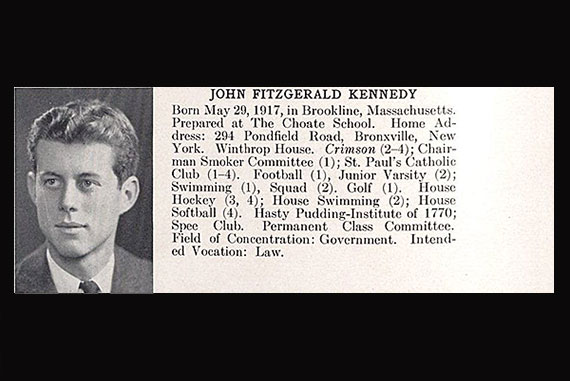
The Class of 1940 Freshman Red Book, given to students once the semester was under way, listed John F. Kennedy’s address as Bronxville, N.Y., his dorm room as Weld 32, and his high school as Choate. Photos courtesy of the Harvard University Archives
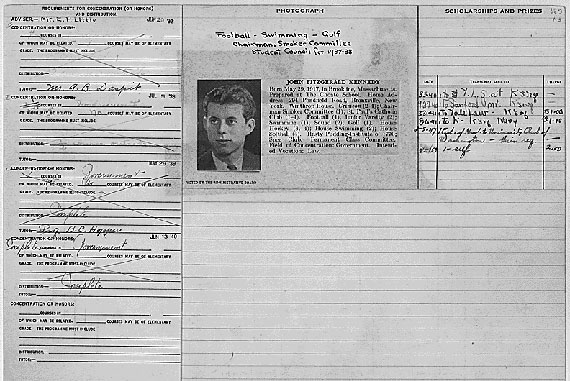
Kennedy’s academic records reflected his campus memberships as “Football, Swimming, Chairman of Smoker Committee.”
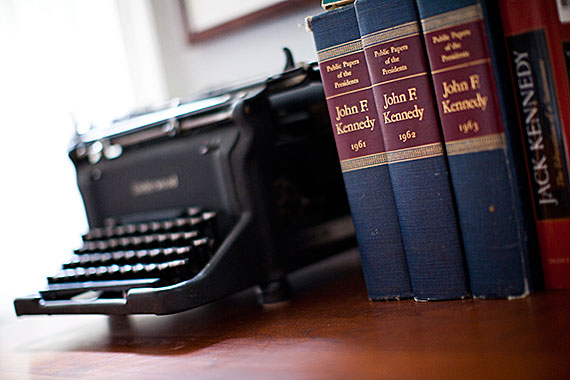
Kennedy’s suite in Winthrop House has been restored to reflect its former resident. Three of the Kennedy brothers, John, Joseph, and Edward, lived in Winthrop House. File photo by Stephanie Mitchell/Harvard Staff Photographer
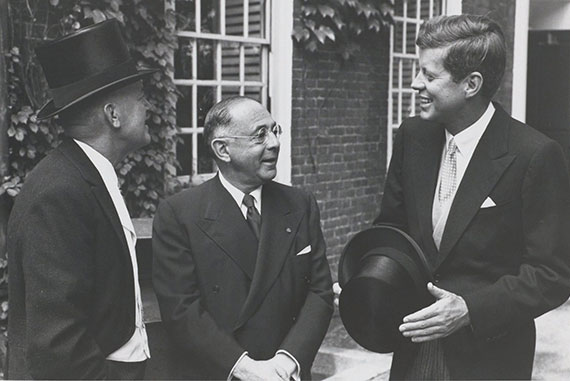
In 1959, Sen. John F. Kennedy, Class of 1940, attended Harvard’s Commencement. Kennedy spoke with Harvard Treasurer Paul C. Cabot (left) and Sidney Weinberg, senior partner at Goldman Sachs, who received an honorary degree that day.
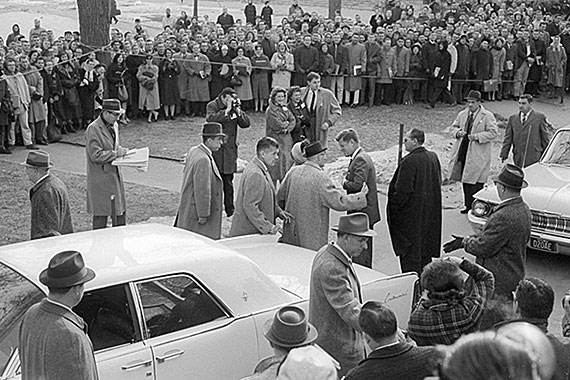
Kennedy was photographed as he arrived to attend a Harvard Board of Overseers meeting on Jan. 9, 1961, less than two weeks before he was to be inaugurated as president.
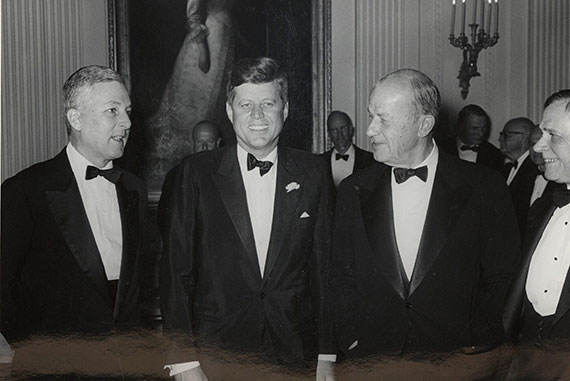
Kennedy, who was elected to the Harvard Board of Overseers in 1957 and served until 1963, held an Overseers’ meeting at the White House on May 13, 1963.





